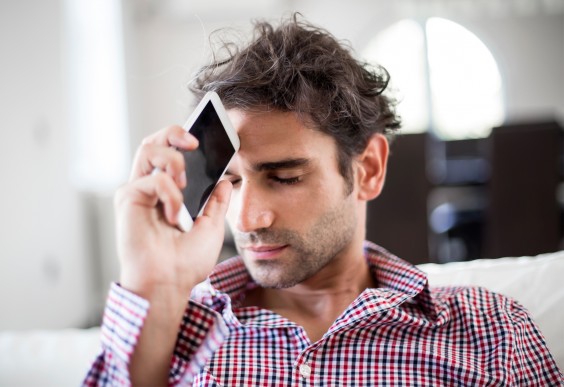Whether it’s the death of a loved one, a devastating breakup, or a super sad movie, plenty of things in life can bring you down. And it can happen to anyone. (Even the most optimistic people in the world aren’t always happy.)


Feeling all the feels is common—and even beneficial, researchshows. “Sadness is a normal part of the range of emotions that humans typically feel,” says Russ Federman, Ph.D., a clinical psychologist based in Charlottesville, Virginia. “These feelings will occur throughout your life as appropriately sad events happen.”
But if you’ve been bummed for a long time and can’t seem to snap out of it, a nagging thought may come to mind: Am I actually depressed? Read on for a few ways to tell if you're experiencing more than just the usual blues.
What It Means to Be Sad
“Sadness is attributable to a situation,” says Margaret Wehrenberg, Psy.D., clinical psychologist and author of The 10 Best-Ever Depression Management Techniques. In other words, you can fill in the blank: “I’m feeling sad because ____”. (I broke up with someone I loved. My grandfather died. I lost my job. My best friend and I had a fight.)
Any of those situations would leave you in a tough spot. But if you can see the silver lining or know you'll find an eventual solution, it’s likely you’re experiencing sadness—one of the emotions that make you human. (Side note: You should never feel ashamed to seek help for any emotions or situations you’re processing—even if it's just sadness. These 81 mental health resources are a good place to start.)
Another sign of sadness? Even in the depths of your misery, you can be temporarily distracted from the pain, Wehrenberg says. You can find some way to lift your spirits, whether it's spending time with friends, watching a funny movie, or playing a sport you love.
To be clear: We’re not downplaying feeling blue. Sadness related to loss, disappointment, unfulfilled needs, a breakup, or a death can be intense and last for weeks, Federman says.
In addition, the negative emotions associated with premenstrual syndrome (PMS) are real. “Women, especially age 18 to 35, commonly experience mood issues—feeling down, fatigued, anxious, or panicky—associated with PMS, the week or two before their period starts, says Tara Allmen, M.D., a board-certified gynecologist. “When their cycle starts, they’ll realize: ‘Aha, that’s why I was feeling so emotional.’”
However, sadness—eventually—lifts, Wehrenberg says. Gradually, you’ll recover, the negative feelings will subside, and you’ll begin to feel better, lighter, and even happy again.
When It's More Than Just a Rough Patch

On the other hand, depression is a persistent, long-lasting mental health condition that interferes with daily life. It affects about 7 percent of American adults, or 16 million people—immediately differentiating it from sadness, which everyone experiences.
“Depression affects more aspects of our well-being and functioning,” Federman says. Like sadness, a painful life event can trigger it, but unlike sadness, the extent to which depression takes hold and drags us down is much greater.
People who have depression may experience:
“When feelings of sadness spread and encompass all these feelings, that’s when it progresses toward clinical depression,” Federman explains.
Also, watch out for feelings of hopelessness or helplessness—common denominators of depressive thinking, Wehrenberg says. In other words, you have no hope for the future, you feel helpless to improve your situation, and these “ruminating negative thoughts” are hard to interrupt or ignore.
Depression can occur in varying degrees. “If it’s mild, people may persistently feel negative or blue,” Wehrenberg says. If it's moderate to severe, it starts to interfere with your daily life. You may stop getting out of bed, cleaning the house, doing laundry, filing papers, or completing assignments, whether at school or at work.
Put another way: While a sad person may not want to get up and go to work, they still do, Wehrenberg says. But a depressed person simply may not get out of bed at all, unless the stakes are high (e.g., you’ll get fired). If you’re sad, you’ll still hang out with friends when they ask you to, but when you’re depressed, you may ignore their texts and calls completely.
What Does Treatment Involve?

You don't need to go see a psychiatrist right off the bat, Federman says. If you feel you may be dealing with something more serious than sadness, first try talking with friends who care about you, Federman says. If that isn't helpful or you realize your issues are more complex, then it's a matter for a mental health professional.
The point of needing to seek professional help is different for each person, he explains. As a general rule, when a person no longer feels capable of handling things on their own, or their condition is affecting their daily life (their job, relationships, home), it’s time to seek treatment. While it may be scary, know that the faster you intervene, the better off you’ll be, Wehrenberg says.
Start with psychotherapy (or “talk therapy”), Federman suggests, versus psychiatry, which is more oriented toward prescribing medication. “See someone who’s skilled at psychotherapy, then that person can advise whether meds are helpful,” Federman says.
Since the causes of depression are complex and variable, so are the treatments. Research has shown that psychotherapy is an effective first course of treatment. The most common approach is calledcognitive behavioral therapy (CBT), which can be highly effective in helping people manage depression, Wehrenberg says. It involves helping patients to use their own brains to change their behavior, allowing them to view their environment in a more positive and realistic way.
And remember: "When you seek help, it doesn’t mean you’ll be in therapy for the rest of your life," Wehrenberg says. In fact, given the proper tools in therapy, a depressed person may begin to understand how to control or eliminate their symptoms without medication.
That said, while Wehrenberg believes the typical category of drugs used (SSRIs) are overprescribed, medication in addition to psychotherapy does have a place. For individuals with moderate or severe depression, bipolar disorder, or postpartum depression, this may be the case. “The causes of these disorders are very complex in terms of brain chemistry,” she says. “The more complex your condition, the more likely you are to need to see a psychiatrist.”
How to Help Yourself
In the meantime, if you don't think you're depressed, but you’re feeling down, here are some simple steps that can help lighten your mental load. (Want more? We've come up with 25 science-backed ways to feel happier.)
1. Change one thing.
For starters: Simply change what you’re doing right now, Wehrenberg suggests. “Get up and move around, make something with your hands, play guitar, draw something, cook a healthy dinner,” she says. “If you take a creativity break for just 20 minutes, you can come back to whatever problem you’re trying to solve with a fresh approach.”
2. Find something to laugh at.
Watch a hilarious video on YouTube. Read your favorite funny blog. But since the best laughter occurs between people, Wehrenberg says, being with good friends is the single best thing you can do if you’re feeling down in the dumps.
3. Consider volunteering.
While it may take extra effort, try to think about someone else. "Connecting to something greater than yourself, whether you do so through a spiritual practice like prayer or meditation or byvolunteering for a cause you believe in, can be a very good way to lift your spirits," Wehrenberg says. (Here are 41 ways to give back.)
4. Be kind to yourself.
Finally, don’t forget some good old-fashioned self-compassion. "Self-care is a wonderful mood lifter," Wehrenberg says. Need some inspiration? Check out these 25 research-backed ideas to take better care of yourself.
The Takeaway
Sadness is a normal human emotion. Depression is a condition that affects the lives of many people in a major way. It's OK to feel down, but know that the fog will gradually begin to lift—and that there are ways to help yourself get there faster. If it's something deeper, it's worth talking to a trusted friend or mental health professional to figure out the best way to help you start living the life you deserve.



No comments:
Post a Comment